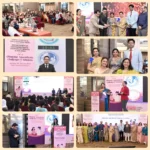
LIFE SAVING METHODS : An Indian perspective
Dear Friends; Resuscitation using life saving methods is a mainstay in emergency situations. We, the health care providers should be well verse and thoroughly updated with resuscitation guidelines and techniques. The developed nations like American, Australian and European countries have set different guidelines of resuscitation which include well defined protocols and organisationally designed algorithms. These guidelines are revised intermittently based upon continual research and meta-analytical studies. The developing countries like ours follow these protocols.
The American Heart association ( AHA ) resuscitation guidelines are most well accepted and followed in India. These Algorithms are differentiated as per target population seeking training in these certified courses. There are broadly two types of algorithms. The one is Basic Life Support ( BLS ) algorithm for health care providers appplicable to doctors , nursing staff and paramedics. The second is Advanced Cardiac Life Support ( ACLS) programme which is structured training course for doctors and nurses . The AHA guidelines are revised every five years with last updation done in year 2015. These algorithms include detailed stepwise manoeuvres done in cardiorespiratory cerebral arrest situations in diversified emergency circumstances. These guidelines are designed in such a way to be applied in variety of circumstances on large scale considering vast spectrum of field of emergency medicine worldwide. Though in Indian scenario too, these algorithms are practically applicable and reasonable but there are always certain confounding factors considering particular geographical variabilities, inequitable & non uniform health standards and sectorial differences varying over the places all over the nation. The India being a large nation with diversities prevalent in every field including health sector leads to difficulty in maintaining uniformity and standardisation in terms of application of resuscitation guidelines specially when they are set up in other developed nations.
The Research is ongoing process. The results of research are seen in the form of advancement and sophistication in health sector hence, in this process, Indian Resuscitation Council ( IRC ) proved to be an important milestone. Due to the joint efforts and brilliant contributions by many Indian eminent academicians and masters of field of Medicine, there was landmark achievement in field of Emergency Medicine in the year 2017. IRC came up with special guidelines and algorithms of Cardio-pulmonary cerebral resuscitation ( CPCR ) applicable in Indian scenarios . These new guidelines were approved by various resuscitation and Emergency Medicine agencies and authorities. After proper framing and drafting, IRC guidelines were approved and published in November 2017 issue of Indian Journal Of Anaesthesia ( IJA ). IRC along with support of Indian Society of Anaesthesiologists, National Head Quarters ( ISA NHQ ) has set up this program with a goal of making this venture accepted not only nationally but also globally. The Social media platforms like Facebook etc. were used for this purpose. A website was set in name of cprindia.in. Tremendous efforts are taken for creating public awareness and various sensitisation programs are being conducted. Various city and state branches of ISA are working enormously in this direction. There are three different algorithms designed by IRC which are as follows:
- COLS ( Compression Only Life Support )
- For lay persons, field workers and auxiliary staff in Outside Hospital Arrest Situations
- BCLS ( Basic Cardiopulmonary Life Support )
- For Health care providers , nurses & paramedics in Inside Hospital Arrest Situations
- CCLS ( Comprehensive Cardiopulmonary Life Support )
- For Doctors and nurses in advanced settings and tertiary care centres
There is need of proper teaching programs in which these guidelines and differences of COLS, BCLS & CCLS are explained in elaboration along with clearing doubts and solving queries.
My experiences : In Government sector , we receive many patients belonging to rural and tribal areas . For instance, once there was a 10 year old patient in casualty with history of seizure episode , when examined found to be having aspiration landing up in cardiac arrest. When proper history was elicited from parents, they accepted that after a seizure , they gave a bout of kerosene oil in his mouth as a part of quackery. Another example is an eye opener to all of us. Once , I witnessed a teenager boy convulsing on roadside who soon landed up in cardiac arrest. I instantly acted and started COLS and revived him to be shifted to near by hospital. Meanwhile, bystanders continued giving weird advises like make the victim smell shoes, onions etc. or give him Kerosene oil to drink etc.
There are lots of myths and taboos involved which are quite reasonably prevalent in grass root levels. There are multiple factors like transportation issues, lack of resources and dearth of health care facilities in tribal areras. Other factors like illiteracy ,low socioeconomic strata, unawareness , inaccessibility and non acceptability are also associated and responsible for non compliance and dangerous consequences. Hence application of Indian Guidelines is need of an hour.
As Hon. Secretary of ISA-NCB, under the banner of organisation , our motto was to create maximum possible public awareness in this regard . We conducted multiple training and sensitisation programs at various schools, colleges, gardens, swimming pools , public places , hospitals and nursing homes and trained around 6000 people from different fields with these life saving skills . Our agenda was to sensitise the population towards the subject of resuscitation and IRC guidelines. The day is not far when atleast one member of every family will be updated in life saving skills and our goal of “EVERY CITIZEN A LIFE SAVER” would be achieved. It is said that “ The knowledge ascends if it flows” . Let the spirit of “YOU CAN SAVE A LIFE” flow and be it a bliss like a true “JEEVAN-SANJIVANI” .
Dr. Umesh Ramtani,
Hon. Secretary , ISA-NCB 2018-19
Asst. Prof. , Anaesthesiology, IGGMCH, Nagpur

